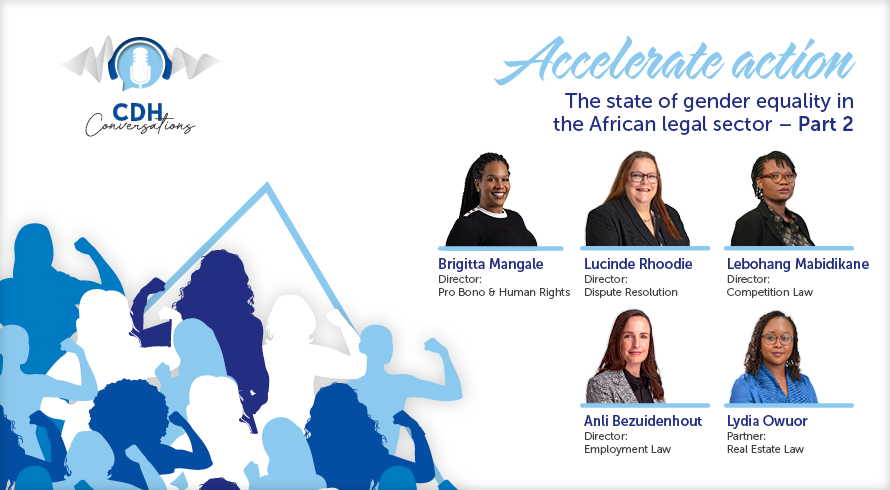Simple agreements for future equity: An African perspective
At a glance
- A Simple Agreement for Future Equity (SAFE) is a cash investment that grants an investor the right to acquire future equity in a company, commonly used in US and European start-up markets.
- SAFEs are favored in seed financing rounds of fast-growing companies, particularly in e-commerce and fintech sectors, providing investors with the opportunity to obtain equity upon the occurrence of a triggering event.
- While SAFEs have not been widely used in Africa, the continent's growing start-up industry and the potential for unicorn companies indicate a possible increase in the use of SAFEs, especially in fintech and e-commerce sectors. Investors and entrepreneurs should understand the intricacies of SAFEs in this context.
So what is a SAFE? In simple terms, a SAFE is a cash investment in exchange for an agreement that provides an investor with the right to acquire future equity in a company. The investor does not become a member of the company, nor does the investor acquire any voting rights or any other rights in the company as a shareholder. Further, the investor does not obtain the right to repayment of their cash investment, nor earn any interest on the cash investment.
The concept of a SAFE was introduced in 2013 by the Y Combinator in the US to help a young start-up company raise capital quickly and easily. The SAFE document has since been used as a ‘template’ by start-up companies in the US, Europe and Canada when raising seed-funding, with a few developments to the SAFE over the years.
The SAFE has not been a popular investment option in Africa. This is mainly due to the fact that the start-up market in Africa is still considered to be in its infancy stage. We have, however, recently learned of a few transactions where a SAFE has been used or considered as an investment option in Africa. It is therefore important for an entrepreneur or an investor to understand what a SAFE is and to analyse whether it could become a popular option in Africa.
How does a SAFE work
A SAFE is used by investors who are looking to invest in start-ups in their seed financing rounds. Typically, these start-ups are fast-growing companies with innovative ideas that are quickly taken up in a market. These are usually seen in the e-commerce and fintech industries.
A SAFE provides the investor with the right to obtain equity in the company on the occurrence of a triggering event. This triggering event could either be a liquidity event, a merger, IPO or a future qualified equity investment. The future qualified equity investment is more typically seen in SAFEs and it provides the investor with the right to obtain the same type of equity that a future investor obtains.
The percentage of equity to be obtained by the investor, on the occurrence of a triggering event, is usually determined by a valuation cap. The valuation cap basically sets the maximum company value. For instance, an investor may choose to invest USD 5,000 with a valuation cap of USD 100,000 to obtain 5% equity in the company upon the triggering event taking place.
Further, the conditions and rights provided in a SAFE may vary as these depend on the number of investors proposing to invest in the company as well as the level of investment each investor is willing to make. An investor may also negotiate to enter into a pro-rata side letter giving the investor the right to make additional investments in future seed investment rounds, thus increasing their capacity to acquire future equity.
Benefits and drawbacks
The main drawback of a SAFE is the question of the value of the company. The cash investment is made on the potential of the company and not on its actual valuation. This, therefore, leaves the investor open to losing their investment or not acquiring their investment worth. Further, if the company fails, the SAFE becomes worthless. In essence, the investor takes on all the risk while the company bears little to none.
Further, companies carrying out seed fundraising in this manner typically have a plethora of investors pursuing to invest in the company. This may cause each investor to have less bargaining power. This could particularly be an issue for sophisticated investors as the company will generally dictate the terms of a SAFE.
However, the most significant advantage of a SAFE is the ease and speed of execution at a lower transaction fee. The SAFE also provides the investor with a unique opportunity to invest in a start-up in its early stages, potentially providing the investor with substantive returns.
An African perspective
As stated, SAFEs are typically used for fast-growing companies with the potential to grow into unicorn companies, which are start-ups that are valued at over USD 1 billion. The US was reported to have 670 unicorn companies as of April 2021. Unicorn companies are known to grow fast, causing investors to have to make quick decisions on whether or not to invest in them. To put this in perspective, the fastest company to become a unicorn in the US was Aptos in March 2022 – the company was founded in December 2021 by former employees of Meta Platforms, Inc. Taking this into consideration it is understandable why investors would decide to use the SAFE route and not the traditional route of investing, which takes a longer period of time.
Africa, on the other hand, has a very young but robust start-up industry. It is only recently that Africa has produced unicorn companies such as Jumia, Flutterwave, Interswitch Group and Fawry. These companies are in the fintech and e-commerce industries. As a result, both local and international investors are taking a keener interest in start-ups in Africa. In this respect, the venture capitalist and angel investor industry in Africa has seen some significant growth over recent years.
We are also increasingly seeing angel investors and venture capitalists look to make quick investments within a span of less than two months so as to not miss out on the opportunity to invest in rapidly growing industries and companies.
With the predicted growth of the start-up market in Africa and the increasing potential of start-ups to become unicorn companies in Africa, we foresee an increased use of SAFEs in Africa, especially in the fintech and e-commerce industries. It is therefore prudent for investors and entrepreneurs to familiarise themselves with the intricacies of a SAFE.
The information and material published on this website is provided for general purposes only and does not constitute legal advice. We make every effort to ensure that the content is updated regularly and to offer the most current and accurate information. Please consult one of our lawyers on any specific legal problem or matter. We accept no responsibility for any loss or damage, whether direct or consequential, which may arise from reliance on the information contained in these pages. Please refer to our full terms and conditions. Copyright © 2026 Cliffe Dekker Hofmeyr. All rights reserved. For permission to reproduce an article or publication, please contact us cliffedekkerhofmeyr@cdhlegal.com.
Subscribe
We support our clients’ strategic and operational needs by offering innovative, integrated and high quality thought leadership. To stay up to date on the latest legal developments that may potentially impact your business, subscribe to our alerts, seminar and webinar invitations.
Subscribe



